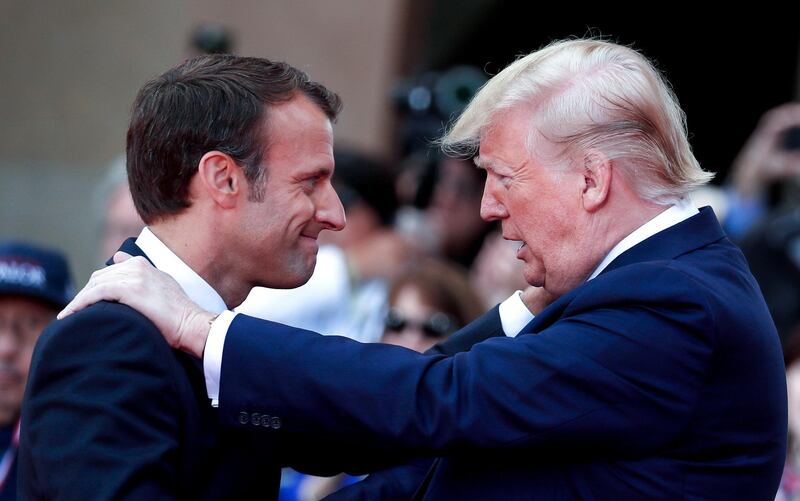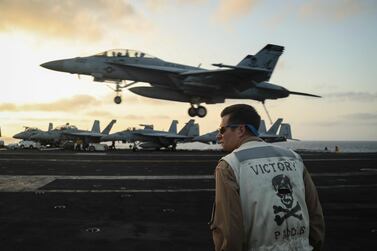The United States and France will work together on Iran despite clear differences, a French presidential source told The National after Presidents Emmanuel Macron and Donald Trump discussed major issues on the sidelines of recent D-Day commemorations.
Despite clear and public differences between the two leaders on Middle Eastern conflicts, tensions with Iran and Brexit, the Elysee Palace official said the pair held “positive and constructive” talks on subjects that require effective action.
“It was a highly important meeting that enabled us to confirm that we could work together on very complicated issues despite our differences,” the source said.
“President Trump is putting a maximum-pressure [policy] on Iran to be able to have a better deal. …But between a maximum pressure and a better deal … there must be something to be done.”
Mr Macron and Mr Trump held a 30-minute private meeting in Caen while leaders gathered in Normandy to commemorate 75 years since the Allied D-Day landings during World War II.
The source said that there must be an agreement of objectives for any dialogue with Tehran and pointed to Mr Trump’s recent visit to Japan, as well as Prime Minister Shinzo Abe upcoming visit to Tehran, as “important” for securing Iranian commitments to the bases of talks. The source said that this was in line with Mr Macron’s proposal of a global platform for talks with Iran that would not just cover nuclear activity but also ballistic missile programmes and its regional policy.
Tehran has rejected the idea of discussions taking place on any other issue than the terms of the 2015 Joint Comprehensive Plan of Action (JCPOA). Mr Trump withdrew the US from the deal last year citing Iranian interference around the region and its ballistic missile programme – neither of which are covered in the agreement on nuclear enrichment.
“It is very important to discuss a very tense situation with Iran and to make the objective very clear to lower the tension and reach the common French-US objective,” the source added. “Our role is to try to create the conditions for lowering the tensions.”
Regional tensions have escalated since April as Washington seeks to end Iranian oil exports. Four tankers off the UAE coast were hit in what officials have called a sabotage attack, two Saudi oil-pumping stations were hit by drone attacks and a rocket landed near the US embassy in Baghdad. The US has deployed the USS Abraham Lincoln carrier group to the Gulf region, saying it will help deter Iranian activity.
The source said both presidents will meet again at the upcoming G20 at the end of June and G7 summit in August.
On Libya, the source said, “We [France and the US] agreed that what is at stake today is heading towards a political phase that requires all actors … to return to the negotiating table on a realistic basis.”
In early April Field Marshal Khalifa Haftar launched an offensive to capture the capital of Tripoli, vowing to end the rule of the militias that have proliferated since longtime leader Muammar Qaddafi was removed in a brief civil war in 2011. However, the commander of the eastern forces has been unable to breach the defences around the capital and fighting has been bogged down in the outskirts.
In the Sahel, where French forces are part of a multinational contingent helping combat Islamist militant groups, the source said Paris has “solid support” from Washington.







